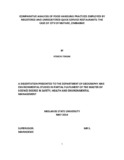Please use this identifier to cite or link to this item:
https://cris.library.msu.ac.zw//handle/11408/2647| Title: | Comparative analysis of food handling practices employed by registered and unregistered quick service restaurants: the case of city of Mutare, Zimbabwe | Authors: | Forichi, Tendai | Keywords: | Fast food industry Developing countries |
Issue Date: | 2014 | Publisher: | Midlands State University | Abstract: | The fast food industry has an important role in meeting the ever increasing food demands of the urban dwellers in developing countries. The catering industry in Zimbabwe is growing exponentially as evidenced by the opening of new takeaways, restaurants, lodges and hotels. It is estimated that 15 percent of the total population in Zimbabwe buy food from various food outlets on a daily basis. The aim of the study was to make an inference on the food handling practices currently prevalent in registered and unregistered quick service restaurants in the City of Mutare. The research was made of two main phases; the first phase involving the use of a structured questionnaire to assess employees’ and clientele food safety opinions, knowledge, attitudes, and self-reported practices. The second phase included the use of detailed food safety observation guide to determine food safety and hygiene practices of food handlers. Collected data were subjected to analysis by a Portable IBM Statistical Package for Social Scientists version 11.0. The results for both registered and unregistered restaurants revealed significant p value > 0.05 indicating that there was no significant relationship between the registration status of restaurants and effectiveness of food handling practices employed. The microbial tests for Escherichia coli, Bacillus, Salmonella and Staphylococcus aureus were conducted on selected food samples, hand swabs, kitchen equipment and food contact surfaces. The results from the assessment indicated that E. coli was detected in all categories of samples, while the Staphylococcus aureus was found mostly on the hands of food handlers. Klebsiella occurred mostly on food contact surfaces and equipment, signifying inadequate hygiene and sanitation. However, Salmonella was detected in a few samples of meat, soup and stew. | URI: | http://hdl.handle.net/11408/2647 |
| Appears in Collections: | Master Of Science In Safety Health And Environmental Management Degree |
Files in This Item:
| File | Description | Size | Format | |
|---|---|---|---|---|
| FORICHI DISSERTATION.pdf | Full Text | 819.06 kB | Adobe PDF |  View/Open |
Page view(s)
268
checked on Mar 2, 2026
Download(s)
322
checked on Mar 2, 2026
Google ScholarTM
Check
Items in MSUIR are protected by copyright, with all rights reserved, unless otherwise indicated.



